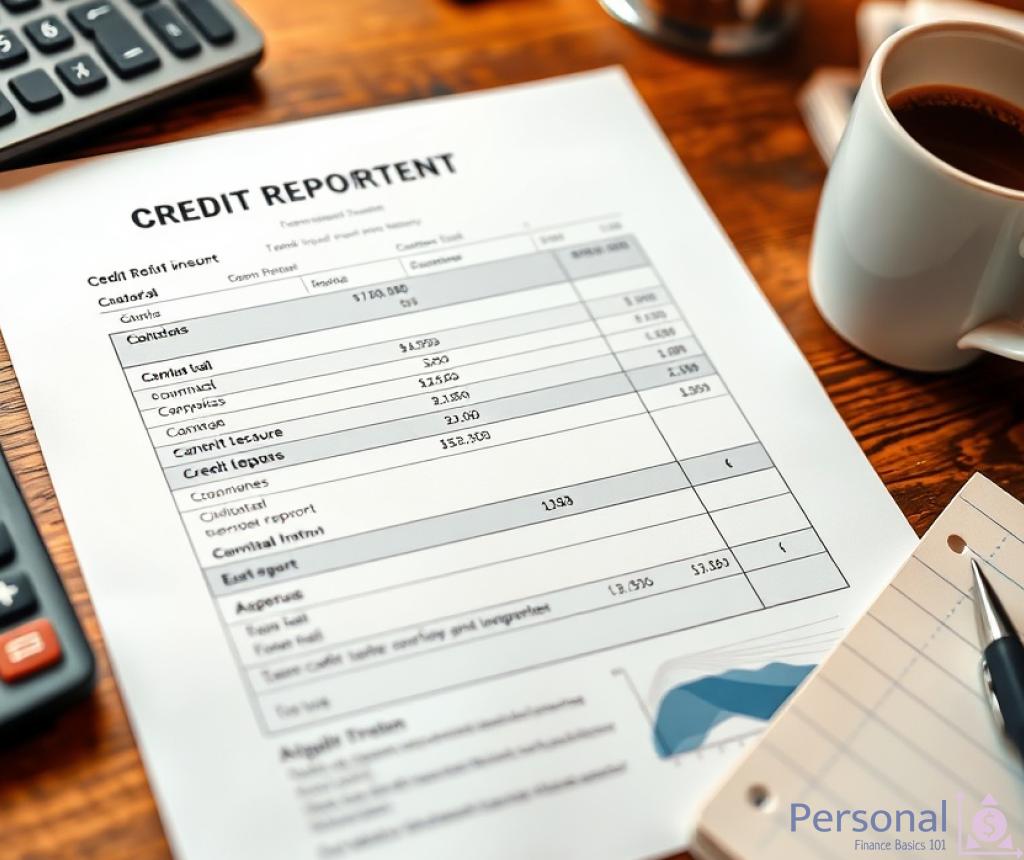Understanding Your Credit Report

Your credit report is a comprehensive document that reveals your financial history. It contains vital information that lenders use to assess your creditworthiness. Understanding the nuances of your credit report is essential for anyone looking to repair their credit on their own. By familiarizing yourself with the components of your credit report, you can identify areas for improvement and take proactive steps toward financial health.
A credit report typically includes several crucial elements, each serving a specific purpose. Being aware of these components will help you understand how they affect your credit score and overall financial standing. Below is a summary of the key components found in your credit report:
- Personal Information: This section contains your name, address, Social Security number, and employment details.
- Credit Accounts: Here, you will find a list of your credit accounts, including credit cards, mortgages, and installment loans, along with their payment history.
- Credit Inquiries: This part shows any requests made by lenders to view your credit report, which can impact your credit score.
- Public Records: This includes any bankruptcies, foreclosures, or tax liens that may affect your creditworthiness.
- Collections: If any accounts have been sent to collections, they will be listed here, along with details of the debt.
Once you have access to your credit report, the next step is to analyze it effectively. This process involves reviewing each component closely to identify any discrepancies or areas that may need correction. Follow these steps to ensure a thorough examination:
- Obtain Your Credit Report: You can request a free copy of your credit report from annualcreditreport.com once a year.
- Review Personal Information: Check for accuracy in your name, address, and other personal details.
- Examine Credit Accounts: Look for any inaccuracies in account statuses, such as missed payments that you made on time.
- Check Inquiries: Ensure that only authorized inquiries are listed and dispute any unauthorized requests.
- Review Public Records and Collections: Verify the validity of any public records and collections listed.
Disputing Errors Effectively
Errors on your credit report can significantly impact your credit score, making it crucial to dispute inaccuracies swiftly and effectively. A well-executed dispute can lead to corrections that reflect your true financial standing, opening doors to better loan terms, lower interest rates, and increased financial opportunities. Here’s how to navigate the dispute process with finesse, ensuring your efforts yield the best possible outcomes.
Understanding the proper steps to dispute errors on your credit report is essential. Each step you take in this process contributes to a clearer representation of your creditworthiness. Below are the critical stages you should follow to dispute effectively:
- Gather Documentation: Collect all relevant documents that support your claim, such as payment receipts, account statements, and correspondence with creditors.
- Draft a Dispute Letter: Create a clear and concise letter detailing the inaccuracies. Ensure you include your personal information, a description of the error, and the supporting documentation.
- Send Your Dispute: Direct your dispute to the credit bureau that reported the error. Utilize certified mail for proof of submission and follow up to confirm receipt.
- Monitor Your Credit Report: After filing your dispute, keep an eye on your credit report for updates and corrections, which typically occur within 30 days.
Once you submit your dispute, understanding the timelines involved can help manage expectations. Credit bureaus are required by law to investigate disputes and respond within a specific timeframe. Here’s a snapshot of what to expect:
| Action | Timeframe |
|---|---|
| Submission of Dispute | Day 0 |
| Investigation Period | Up to 30 days |
| Credit Bureau Response | Within 45 days |
Utilizing this information will not only prepare you for the process but also empower you to take further action if necessary. Remember, persistence is key in achieving a favorable resolution to your dispute.
Building Positive Credit History
Establishing a positive credit history is essential in your journey toward successful credit repair. A solid credit history not only enhances your credit score but also demonstrates to lenders that you are a reliable borrower. By taking proactive steps to build this history, you can open doors to better financial opportunities and lower interest rates. Below are effective strategies to help you cultivate a positive credit history.
One of the most influential factors in your credit history is your payment record. Consistently making payments on time is crucial in establishing a positive reputation with creditors. Here are some techniques to ensure you maintain a stellar payment history:
- Set Up Reminders: Use calendar alerts or mobile applications to remind you of upcoming due dates.
- Automate Payments: Consider enrolling in automatic payment plans for recurring bills to avoid missed payments.
- Prioritize Payments: If finances are tight, prioritize essential bills such as housing and utilities to ensure they are paid first.
A diverse credit mix can positively influence your credit score. This refers to having a combination of different types of credit accounts, such as credit cards, installment loans, and mortgages. A varied credit portfolio reflects your ability to manage different types of credit responsibly. Consider the following approaches to diversify your credit mix:
- Apply for a Secured Credit Card: These cards require a cash deposit, making them easier to obtain and effective for building credit.
- Consider a Small Personal Loan: If feasible, taking out a small loan and repaying it on time can enhance your credit profile.
- Utilize Retail Credit Options: If you shop frequently at a specific retailer, consider applying for their store credit card, but ensure you use it responsibly.
Monitoring your credit regularly is vital to understanding your credit history and identifying areas for improvement. By keeping a close eye on your credit report, you can spot any inaccuracies or negative trends early on. Here are some key practices for effective credit monitoring:
- Obtain Free Reports: Take advantage of the free annual credit reports from each of the three major credit bureaus.
- Use Credit Monitoring Services: Consider signing up for credit monitoring services that alert you to changes in your credit report.
- Review Reports Thoroughly: Examine your credit reports for errors or discrepancies that may require action.
Managing Debt Strategically
In the journey toward effective credit repair, it is imperative to evaluate your existing debt before implementing any strategies. Understanding the total amount of debt you owe, along with the interest rates and payment terms, forms the foundation for making informed decisions. By categorizing your debts into secured and unsecured, as well as prioritizing them based on interest rates, you can develop a clearer picture of your financial landscape. This assessment not only helps in identifying which debts to tackle first but also aids in formulating a realistic repayment plan that aligns with your overall credit repair goals.
Once you have a comprehensive understanding of your debt, the next step is to implement a strategic repayment plan. This involves choosing a method that suits your financial situation while ensuring you remain committed to making progress. Two popular approaches include the snowball method and the avalanche method. The snowball method focuses on paying off the smallest debts first, which can provide quick wins and motivate you to continue. Conversely, the avalanche method prioritizes debts with the highest interest rates, potentially saving you more money in the long run. Whichever method you choose, it is essential to stay organized and maintain a consistent payment schedule to see tangible results.
Another critical aspect of managing debt strategically is negotiating with creditors. Many individuals overlook the power of direct communication with their creditors, yet it can lead to favorable outcomes. If you find yourself struggling to meet payment obligations, reach out to your creditors to discuss your situation. They may be willing to offer lower interest rates, extend payment terms, or even settle for a reduced amount. Documenting any agreements you reach is crucial, as these can significantly impact your credit report and overall financial health. Remember, creditors often appreciate proactive communication, which can foster a more cooperative relationship moving forward.
Utilizing Credit Counseling Services
When navigating the complex world of credit repair, many individuals may find themselves feeling overwhelmed or unsure of where to turn for assistance. While self-directed efforts can yield significant benefits, it is important to recognize that professional help is available. Credit counseling services can serve as a valuable resource in your journey to financial stability. These services offer personalized guidance, educational resources, and strategies designed to help you better understand your credit situation and take actionable steps toward improvement.
Understanding Credit Counseling is essential for anyone considering this option. Credit counseling typically involves working with certified professionals who analyze your financial situation, including your debts, income, and credit report. They provide recommendations tailored to your unique circumstances, ensuring that you have a clear plan moving forward. This process not only helps you identify areas that require attention but also empowers you with the knowledge to make informed decisions regarding your credit repair journey.
One of the primary benefits of engaging with credit counseling services is the opportunity for personalized debt management plans. These plans can be invaluable for individuals struggling to keep up with multiple debts. Credit counselors can negotiate with creditors on your behalf, potentially lowering interest rates or consolidating payments into a single monthly sum. This can alleviate the burden of managing various accounts and streamline your repayment efforts. Additionally, many counselors offer workshops and resources that educate you on financial literacy, budgeting techniques, and strategies to maintain a healthy credit score.
As you consider incorporating credit counseling into your credit repair strategy, it is crucial to conduct thorough research to ensure you select a reputable service. Look for organizations that are accredited and have positive reviews from past clients. Furthermore, understanding the costs associated with these services is essential; while many nonprofit credit counseling agencies offer free consultations, some may charge fees for ongoing support. Evaluating these aspects will prepare you to make an informed choice that aligns with your financial goals.
Disclaimer
This article has been created or edited with the support of artificial intelligence and is for informational purposes only. The information provided should not be considered investment advice. Please seek the support of a professional advisor before making any investment decisions.






